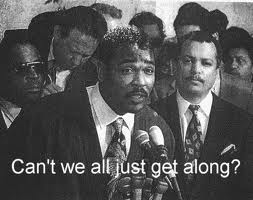“Can’t we all just get along?”
 This is one of those soundbites that I can always recall. I can hear it like it was yesterday. Maybe I can because this line was repeated perhaps more than any other from that time. I remember sketch comedy shows, I think it was In Living Color, doing parodies with this iconic phrase. It was part of the common vernacular for quite a long while, continuing through today even.
This is one of those soundbites that I can always recall. I can hear it like it was yesterday. Maybe I can because this line was repeated perhaps more than any other from that time. I remember sketch comedy shows, I think it was In Living Color, doing parodies with this iconic phrase. It was part of the common vernacular for quite a long while, continuing through today even.
Twenty years ago, in the aftermath of death, fire, and looting, this was a plea for the end of anarchy, hate crimes, and community destruction. I’ve often wondered looking back what “voice” was behind Rodney King during that famous press conference. Was it the voice of the average person in these communities – that was being harmed through the lawlessness of a criminal element? Was it just Rodney King – as the lightning rod of this whole thing who had to deal with the weight of serving as a catalyst for such destruction? Or was it the message of the establishment, those who put King up to the task, who above all probably just wanted the violence to stop as fast as possible so that these could go back to normal (from a safety standpoint).
I’ve asked these questions not out of deep cynicism, but over time I’ve noticed that similar pleas are made all the time in the face of tension and conflict between those with power and those on the margins. I’ve wondered what “getting along” means, when in reality it means very different things to different people. Normally, “can’t we all just get along” is the sentiment of those who don’t want anything to change and they just want to be rid of conflict, danger, and anxiety (which I understand).
A little over three years after the LA Riots, I spent over eight weeks serving and ministering in different locations throughout Los Angeles. Spent a couple weeks downtown at homeless shelters, spent a couple weeks in South Central LA, Compton, and a couple other locations. I didn’t make the link at the time, but one of the factors that drew me to this was going through the riots. I remember wanting to make sure at some point I visited the intersection of Florance and Normandy (which Denny was beaten and much of the initial activity took place. I did visit that intersection and it had a strange historical feeling to it.
That summer, serving with Here’s Life Inner City Los Angeles and its various local partners, was my introduction to both the concept of racial reconciliation as well as the nature of justice – not as an idea, but as a concrete longing and vision of hope and dignity. It was the beginning of more intentional thinking about these issues – what does it mean to “get along” and especially when there are unpleasant or even maybe inappropriate expressions of pain and struggle sparked by the presence of injustice or oppression? It was a very significant summer for me on a few levels, but I find it remarkable that I still recognize some of the impact of that summer on me almost 17 years later.
Vocationally, I frequently find myself in between worlds. No – that does not mean I’m saying I’m bicultural. Not even close. I just frequently have to see realities, decisions, and situations through both the majority culture lens as well as the ethnic minority lens. Obviously, the white lens comes most naturally – because it’s mine. But I’ve grown in being able to recognize and see from the other vantage point as well, though I still routinely miss quite a lot.
 What I’ve observed is that when tension breaks out, whether it’s at a local or national level and if it’s in a ministry or church or even secular contexts, and where there is systemic marginalization (or racism or oppression), there are versions of “can’t we all just get along?” that seem to pop up in the course of trying to work things out. Now obviously, when buildings are burning and people are dying, there is a need to call for humane and constructive solutions, but King’s soundbite has a kind of typology to it and I’ll venture to offer a couple interpretations for this specific type which I’ll label as a “call to unity.”
What I’ve observed is that when tension breaks out, whether it’s at a local or national level and if it’s in a ministry or church or even secular contexts, and where there is systemic marginalization (or racism or oppression), there are versions of “can’t we all just get along?” that seem to pop up in the course of trying to work things out. Now obviously, when buildings are burning and people are dying, there is a need to call for humane and constructive solutions, but King’s soundbite has a kind of typology to it and I’ll venture to offer a couple interpretations for this specific type which I’ll label as a “call to unity.”
First, “Can’t we all just get along?” (be unified) = “Can’t you just go along?”
It’s “Can’t all of you who don’t like what is happening in the grand scheme of things just go along with things and stop causing trouble?” This is where my suspicion of who was behind King’s press conference does come to play. But the instinct for those in the majority is to keep things clean and efficient. There’s a path of least resistance mentality that is often at work and the focus is usually given to eliminating the source of discomfort or minimizing tension as opposed to figuring out what a better future would look like (from the vantage point of those on the outside).
Second, “Can’t we all just get along?” = “Can’t we just go back to the way things were?”
This is a continuation of the above thought. Wanting people to get along amidst various ethnic or socioeconomic-driven tensions rarely involves the kind of reflection and conviction that results in a vision of a new future. That would require such a tenacity and integrity of leadership that is rare. It’s far more common to want to keep doing more of the same and just try to do it in a way that doesn’t set people over the edge.
There’s a heart check when it comes to majority-minority power tensions. Do we try to keep things the same and just try to get everyone to cooperate and fall in line? (An obvious ethnocentric approach) Or do we invest our energies into creating legitimate partnerships and sharing of power for the sake of a different future – the one we usually say we want, but often lack the resolve, awareness, and commitment to pursue?
All this to say, there’s still things to learn from the LA Riots and I’m still learning. When people are not getting along, there are questions to ask first, before we start wanting to make them get along. We need to be men and women who can ask those questions, those questions that get to the heart of what is wrong or unacceptable – for if we don’t there surely aren’t many that will.
This is the end of my series reflecting on the LA Riots. Feel free to share your own reflections or share your own response to what the “Can’t we all get along?” call to unity means. Thanks for reading!
